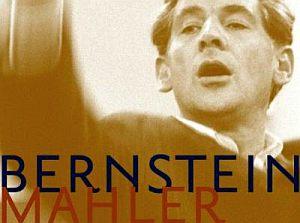For most American music fans in the middle of the last century, Gustav Mahler meant Leonard Bernstein. He was widely regarded as the single source of the Mahler revival or, for most listeners, their first experience.
This is so, even though there have been tremendous performances and recordings of Mahler's music even before the 1960s — or contemporaneously — by Walter, Klemperer, Mitropoulos, Horenstein, Scherchen, Boult, van Otterloo, Szell, Ormandy, Barbirolli, and others, including Charles Adler, whose 1951 recording of the Symphony No. 3 was the first and remained alone until Bernstein published his.
Even in Europe, where Mahler didn't need to be "revived" quite as much, Bernstein was appreciated greatly, his recordings with the Vienna Philharmonic (the "house orchestra" for the Vienna Staatsoper) being justly acclaimed, and his Mahler recording hegemony was nearly as complete as in the U.S.
Uniquely, Bernstein had succeeded Mahler, a generation removed, as music director of the New York Philharmonic, 1958-1969, and both had a vital relationship with the Vienna Philharmonic, Mahler as music director from 1897 to 1907 and Bernstein as principal guest conductor from 1970 to 1979.
Listen to the Music
Mahler Symphony No. 2 Adagio:
//-->
//-->
//-->
Much Mahler has flowed under the bridge since, including — closer to home — the complete cycle performed several times and recorded by Michael Tilson Thomas and the San Francisco Symphony, but MTT mentor Bernstein is still the Mahler champion unto himself, with his powerful, lively, dramatic performances, rightly characterized by Martin Bernheimer as "hyper-passionate, super-romantic, omni-tragic."
In 1960, with the blessings of the composer's widow, Alma, Bernstein began recording the first complete stereo cycle of all nine completed symphonies by Gustav Mahler. That, and more, has been now published by Sony Masterworks in a remastered and remixed 12-disc edition. (The issue coincides with Carnegie Hall's presentation of "Mahler: The Symphonies in Sequence," through May 17.)
In addition to the nine symphonies, the Sony set includes the Adagio from Symphony No. 10, Das Lied von der Erde, with Christa Ludwig, Rene Kollo, and the Israel Philharmonic; and a 1967 audio documentary called "Gustav Mahler Remembered: Reminiscences by Mahler's Associates and by Musicians Who Played Under His Baton," including an interview with Alma Mahler (1879-1964).
The reissue of some four-decades-old recordings brings back (in a cleaner, fuller sound) such artists as soprano Lee Venora and mezzo Jennie Tourel in the "Resurrection" Symphony; mezzo Martha Lipton in Symphony No. 3, soprano Reri Grist in Symphony No. 4; and sopranos Erna Spoorenberg and Gwyneth Jones, mezzos Gwenyth Annear, Anna Reynolds, and Norma Procter, tenor John Mitchinson, baritone Vladimir Ruzdjak, and bass Donald McIntyre with the London Symphony in the Symphony of a Thousand.

